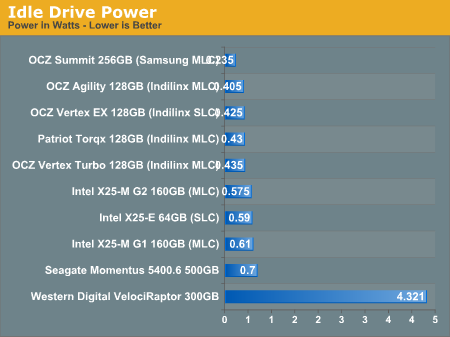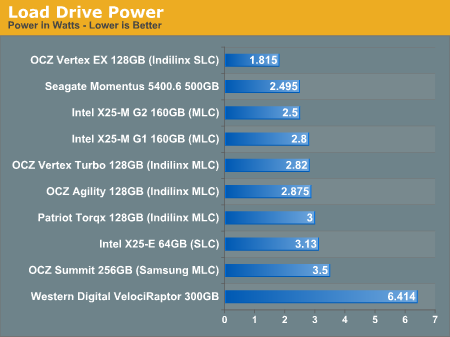The SSD Relapse: Understanding and Choosing the Best SSD
by Anand Lal Shimpi on August 30, 2009 12:00 AM EST- Posted in
- Storage
Power Consumption
SSDs are at their highest power consumption when performing large file sequential writes. The majority of the power consumption comes from writing to the NAND flash and when you’re doing sequential writes you have more flash devices engaged at a time. Thus my peak power consumption test involves measuring power used over the 5V rail while the drives perform my 2MB sequential write benchmark in Iometer and at idle of course.
First, the idle numbers:

The Samsung and Indilinx drives use the least power, while the Intel drives use the most out of the SSDs. Intel honestly just needs to stick some power gate transistors in front of the controller and flash to curb power consumption at idle. They are all still lower than a mechanical drive, and much lower than a 3.5" HDD.
It's also worth noting that given the order of magnitude performance advantage these drives hold over traditional hard drives, they spend far more time at idle than their mechanical counterparts.

Under load the SSDs use anywhere from 2.5 - 3.5W, the exception being the Indilinx SLC drive which comes in at under 2W. Power consumption is roughly half if you switch to a random write workload, and the standings also switch places. While Intel's X25-M G2 draws less power than the OCZ Vertex Turbo in the sequential write test, it draws more power in a random write workload:
| Random Write Power Consumption | Min | Average | Max |
| Intel X25-M G2 160GB (MLC) | 1.55 W | 1.60 W | 1.7 W |
| OCZ Vertex Turbo 128GB (Indilinx MLC) | 1.13 W | 1.17 W | 1.21 W |
As I alluded to before, the much higher performance of these drives than a traditional hard drive means that they spend much more time at an idle power state. The Seagate Momentus 5400.6 has roughly the same power characteristics of these two drives, but they outperform the Seagate by a factor of at least 16x. In other words, a good SSD delivers an order of magnitude better performance per watt than even a very efficient hard drive.










295 Comments
View All Comments
zodiacfml - Wednesday, September 2, 2009 - link
Very informative, answered more than anything in my mind. Hope to see this again in the future with these drive capacities around $100.mgrmgr - Wednesday, September 2, 2009 - link
Any idea if the (mid-Sept release?) OCZ Colossus's internal RAID setup will handle the problem of RAID controllers not being able to pass Windows 7's TRIM command to the SSD array. I'm intent on getting a new Photoshop machine with two SSDs in Raid-0 as soon as Win7 releases, but the word here and elsewhere so far is that RAID will block the TRIM function.kunedog - Wednesday, September 2, 2009 - link
All the Gen2 X-25M 80GB drives are apparently gone from Newegg . . . so they've marked up the Gen1 drives to $360 (from $230):http://www.newegg.com/Product/Product.aspx?Item=N8...">http://www.newegg.com/Product/Product.aspx?Item=N8...
Unbelievable.
gfody - Wednesday, September 2, 2009 - link
What happened to the gen2 160gb on Newegg? For a month the ETA was 9/2 (today) and now it's as if they never had it in the first place. The product page has been removed.It's like Newegg are holding the gen2 drives hostage until we buy out their remaining stock of gen1 drives.
iwodo - Tuesday, September 1, 2009 - link
I think it acts as a good summary. However someone wrote last time about Intel drive handling Random Read / Write extremely poorly during Sequential Read / Write.Has Aanand investigate yet?
I am hoping next Gen Intel SSD coming in Q2 10 will bring some substantial improvement.
statik213 - Tuesday, September 1, 2009 - link
Does the RAID controller propagate TRIM commands to the SSD? Or will having RAID negate TRIM?justaviking - Tuesday, September 1, 2009 - link
Another great article, Anand! Thanks, and keep them coming.If this has already been discussed, I apologize. I'm still exhausted from reading the wonderful article, and have not read all 17 pages of comments.
On PAGE 3, it talks about the trade-off of larger vs. smaller pages.
I wonder if it would be feasible to make a hybrid drive, with a portion of the drive using small pages for faster performance when writing small files, and the majority of it being larger pages to keep the management of the drive reasonable.
Any file could be written anywhere, but the controller would bias small writes to the small pages, and large writes to large files.
Externally it would appear as a single drive, of course, but deep down in the internals, it would essentially be two drives. Each of the two portions would be tuned for maximum performance in different areas, but able to serve as backup or overflow if the other portion became full or ever got written to too many times.
Interesting concept? Or a hair brained idea buy an ignorant amateur?
CList - Tuesday, September 1, 2009 - link
Great article, wonderful to see insightful, in depth analysis.I'd be curious to hear anyone's thoughts on the implications are of running virtual hard disk files on SSD's. I do a lot of work these days on virtual machines, and I'd love to get them feeling more snappy - especially on my laptop which is limited to 4GB of ram.
For example;
What would the constant updates of those vmdk (or "vhd") files do to the disk's lifespan?
If the OS hosting the VM is windows 7, but the virtual machine is WinServer2003 will the TRIM command be used properly?
Cheers,
CList
pcfxer - Tuesday, September 1, 2009 - link
Great article!"It seems that building Pidgin is more CPU than IO bound.."
Obviously, Mr. Anand doesnt' understand how compilers work ;). Compilers will always be CPU and memory bound, reduce your memory in the computer to say 256MB (or lower) and you'll see what I mean. The levels of recursion necessary to follow the production (grammars that define the language) use up memory but would rarely use the drive unless the OS had terrible resource management. :0.
CMGuy - Wednesday, September 2, 2009 - link
While I can't comment on the specifics of software compilers I know that faster disk IO makes a big difference when your performing a full build (compilation and packaging) of software.IDEs these days spend a lot their time reading/writing small files (thats a lot of small, random, disk IO) and a good SSD can make a huge difference to this.